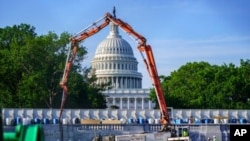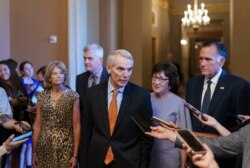The U.S. Senate is starting debate on a new infrastructure spending package after President Joe Biden and a group of centrist Republican and Democratic senators reached agreement on it after weeks of wrangling over what to include and how to pay for it.
The White House declared Wednesday that the roughly $1 trillion package, including $550 billion in new allocations, would add about 2 million jobs to the U.S. economy each year for a decade. Many of those will be in construction work to repair the country’s deteriorating roads and bridges, building new broadband connections in rural areas of the U.S. and improving transit and water infrastructure.
In a rare show of bipartisanship, the Senate voted 67-32 Wednesday evening to proceed with debate and votes on amendments to the legislation, although final overall congressional passage of the measure could be weeks away.
“This deal signals to the world that our democracy can function,” Biden said in a statement. “We will once again transform America and propel us into the future.”
The White House said the package, one of Biden’s biggest legislative priorities, “will grow the economy, enhance our competitiveness, create good jobs, and make our economy more sustainable, resilient, and just.”
While Biden had reached a basic agreement with five Republican and five Democratic centrist lawmakers a month ago, the lawmakers and White House negotiators stalemated over how much to spend on specific types of infrastructure.
The deal now, according to the White House, includes the biggest-ever federal investment in public transit, $39 billion, to upgrade and expand rail and bus systems, as well as the biggest-ever expenditure for passenger rail service since the creation of the existing Amtrak passenger rail system in 1971.
The spending plan calls for significant spending for bridges, clean drinking water and wastewater infrastructure, access for all Americans to high-speed internet, thousands more electric vehicle charging stations and improvements to the country’s electric grid.
“We now have an agreement on the major issues," said Senator Rob Portman of Ohio, the lead Republican negotiator with Democrats. "We are prepared to move forward."
Biden voiced his approval as he toured a truck plant in Pennsylvania. "I feel confident about it," he said.
Biden, six months into his four-year presidency, views the infrastructure package as especially important to show voters that bipartisan deals can be worked out in politically fractious Washington.
Portman said the package will be “more than paid for,” although the White House was vague in describing the funding.
The White House said the deal “will generate significant economic benefits.” It said the package will be paid for with “a combination of redirecting unspent emergency relief funds, targeted corporate user fees, strengthening tax enforcement when it comes to crypto currencies, and other bipartisan measures, in addition to the revenue generated from higher economic growth as a result of the investments.”
Now, Biden is planning to advance, solely with the votes of Democratic lawmakers and no Republican support, a more ambitious $3.5 trillion human infrastructure package focusing on childcare, tax breaks and health care that touch almost every aspect of American life.
It would be paid for by raising the country’s corporate tax rate and taxes on individuals earning more than $400,000 annually, both of which Republicans oppose.






